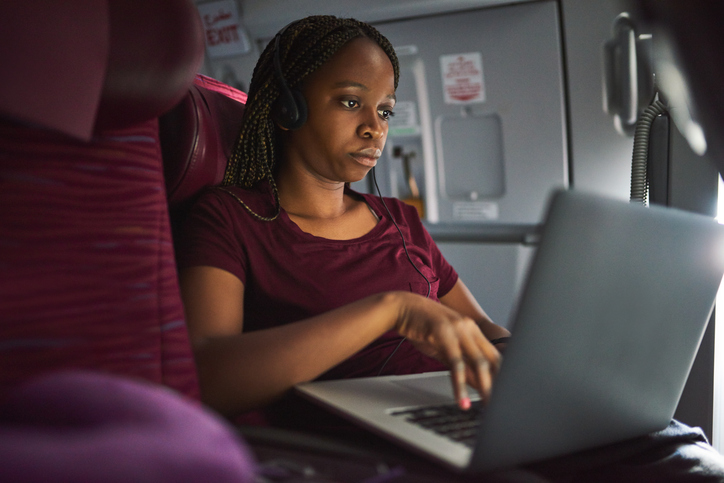So, you’re getting excited about your first plane trip in ages, but you have a fear of flying. Your suitcase is packed, and you have a fantastic itinerary put together. Your friends in another state or country have said they’ll give you a warm welcome at the airport with signs and balloons.
There’s just one fly in the ointment. You never quite got over that news story about that plane crash, even though it happened a decade ago. Nor did you forget that time you encountered turbulence on a plane that was so severe it made your stomach flip. That falling sensation in your gut when on a roller coaster might be thrilling, but on a plane thousands of feet in the air? Not so much.
You aren’t alone in this fear. According to Time Magazine, “12.5% of Americans will struggle with a phobia, with aviophobia among the most common.”
Here are some suggestions of how to navigate your fear of flying.
Statistically Speaking, The Odds Of A Safe Flight Are In Your Favor
There is a greater chance of getting into a car accident en route to the airport than a plane accident. In fact, of all the modes of transportation, motorcycles are among the most dangerous, followed by cars and trucks.
According to CNN Business, more than 113,000 people were killed riding in cars or trucks in the last five years, and that’s because most people often travel in cars and trucks. Moreover, according to a recent study by the International Civil Aviation Organization (ICAO), there were only 92 commercial airline accidents out of 33 million estimated flights worldwide.
Try To Use Reason To Combat Your Fear
Mostly, fear is irrational and not rooted in reality. In her interview with Travel And Leisure, Dr. Rebecca Hoffenberg shared her observations of patients struggling with aviophobia.
“When people come in wanting to address a fear of flying, they will often say that they know flying is a safe form of travel, and this may make sense to them in a rational, logical way. The problem is that their body has formed a response pattern where airplanes have become associated with anxiety.”
This may be easier said than done, but tell yourself to trust the aeronautical engineers, the scientists, and of course, the pilots who make flight possible, safe, and efficient.
Meditate
Consider adding meditation to your routine so that it becomes second nature when you fly. Close your eyes to shut out what’s around you, and take deep breaths. Smarter Traveler suggests that you “breathe slowly and deeply for a count of five or ten, in through your nose, and out through your mouth.” You’ve got this!
Sip An Adult Beverage
Be reasonable with this of course, but getting a little tipsy just before, or during a flight can quell anxiety, fear, and overthinking.
It doesn’t have to be hard liquor, necessarily. According to Time Magazine, 53% of people who participated in a survey, said they felt relaxed after drinking wine. Red wine in particular can make you feel relaxed enough to fall asleep.
Remember, you’ll soon be out of that flying capsule, luxuriating on the beach with a cocktail as the sun activates your melanin.
Stay Up All Night The Day Before
If you know you won’t be able to sleep on the plane, exhaust yourself in advance so that you basically must sleep once you’re in your seat.
Listen To Music Or Watch Movies
Plane features are always evolving, and even in coach, airline carriers offer a selection of movies and music. In the event the selection is lackluster, come prepared with your laptop or other device fitted with the movies and music you prefer.
Catch Up On Your Reading
Often, we are so busy with work, family, and other obligations, that we neglect life’s simple pleasures such as reading. A plane ride is the perfect time to catch up on that book you’ve been neglecting. Hopefully, you’ll become so engrossing that you’ll forget you’re flying.
Hold Hands At Take Off
Don’t ask the stranger next to you to do this, obviously. But if you happen to be flying with a family member or friend, and the roar of the engines during takeoff is unsettling, ask if you can squeeze their hand.
If physical contact isn’t desired, engage in discourse with them about something unrelated to flying as a distraction. Or, you can speak to them frankly about your fear. Sometimes talking things out with somebody who won’t judge you can be therapeutic.
If The Fear Is Truly Paralyzing, It May Be Time To Contact A Professional
A professional can help you identify the cause of your aviophobia, and related fears such as claustrophobia (fear of enclosed spaces) and acrophobia (fear of heights). They can help you pinpoint why you fear not being in control (you won’t be on a plane, unless you’re the pilot) and develop ways to move past that.
Exposure therapy, which involves simulating flight using virtual reality equipment, might also be recommended.





